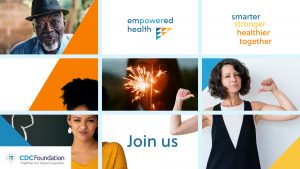The Million-Dollar Question: Can Empowerment Help People Take Steps to Prevent, Conquer, and Control Cancer?
Posted on byLisa Richardson, MD, MPH
Director, CDC’s Division of Cancer Prevention and Control

2020 was a rough year for everyone. And if you happened to experience a serious medical condition, like cancer, you may have been particularly challenged. The shutdown of most medical services at the beginning of the pandemic disrupted cancer care across the board, from missed appointments for cancer treatment to delayed screening visits for mammograms and colonoscopies. From fear of getting sick, many people chose not to go to hospitals and clinics for screening and regularly scheduled treatments. And many have been overwhelmed by emotional stress.
As we enter a new year, it’s important for people to feel empowered to seek the care they need and to take actions to stay healthy. That’s why I’m excited about a new program from the Centers for Disease Control and Prevention (CDC) and the CDC Foundation, EmPOWERed Health.
The program was inspired by the question: Could the number of cancer deaths be lowered by helping people take a more active role in their health and health care?
Research shows that it can. We reviewed published literature and found that empowerment may result in more people getting screening for cancer as well feeling greater control during a cancer diagnosis and treatment.
Below, some members of the EmPOWERed Health community share how empowerment has improved their physical and mental health:
Dr. Liz O’ Riordan, breast cancer survivor and breast cancer surgeon:
“As both a breast cancer surgeon and patient, I have been a part of both sides of the cancer experience. Speaking as a clinician, I cannot emphasize enough the importance of treating your patient as an equal partner in healthcare decision making. As a patient, having the information and confidence to express your opinion makes you feel more in control and able to cope with a challenging situation.”;
Dave deBronkart (“e-Patient Dave”), kidney cancer survivor, blogger, health policy advisor, CPO at PocketHealth, and international keynote speaker:
“Being empowered doesn’t mean patients take over – far from it. It’s about having a collaborative partnership with your medical team, who welcome you as a driver of your health journey, not a passive passenger. And it is a journey: it doesn’t happen overnight, and thoughtful, evidence-based thinking is needed, for both you and your medical professionals.”; and
Allison Rosen, colorectal cancer survivor, patient advocate, and motivational speaker:
“The EmPOWERed Health program is tackling more than creating awareness or knowledge…they’re tackling HOW to develop skills that evoke and promote feelings of empowerment. During my journey with colorectal cancer, I read a lot about “being your own advocate,” but it took some time to understand that it’s not just a feeling…it involves a mechanism of action.”
All of this sounds great, right? But being sure you’re taking care of yourself takes time. We’ve spent the past several months speaking to individuals, caregivers, and healthcare providers to understand what empowerment means to these different groups of people, and how individuals and healthcare teams feel about the conversations they have about cancer and cancer prevention. We’re now ready to move to the next phase of designing and building tools to help people from all backgrounds learn to make decisions regarding their healthcare that match their values. We plan to include members of the general public and the oncology community, as well as new partners, like those from the worlds of technology and entertainment.
In the meantime, you can learn more by visiting our new (and evolving) website, www.EmpoweredHealth.org, and by joining the Empowered Health community on Instagram.
Posted on by

